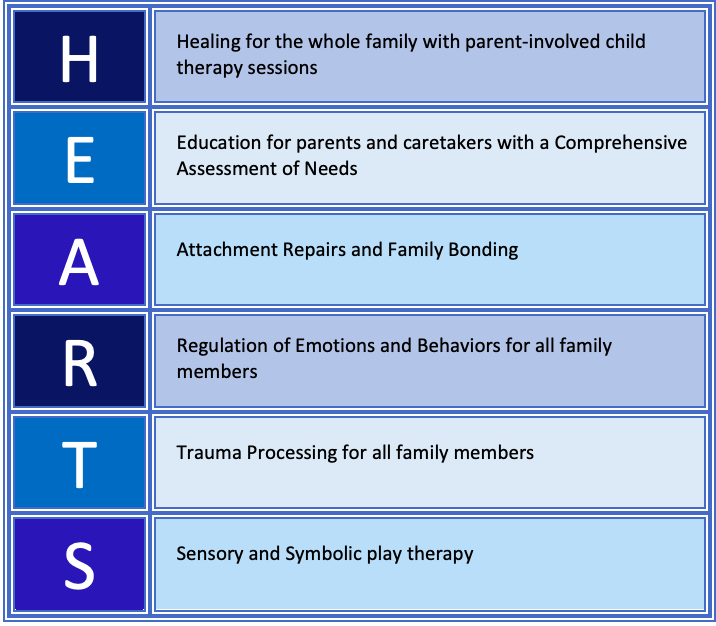Heart to Heart's Model of Therapy -- HEARTS
Heart to Heart uses a comprehensive team approach to assess and treat a variety of childhood traumas, including trauma originating from abuse, neglect, and foster placement or adoption. While working and teaching in the field of child and family psychology for over 30 years, Dr. Kathleen developed the HEARTS therapy model to address the comprehensive needs of children and families during the trauma therapy healing process. The HEARTS model is a culmination of Dr. Kathleen’s successful work bringing healing to children and their families. Many therapy models try to fit a child into a predetermined box or known therapy. The HEARTS model however, removes the conventional box approach and sees the therapy process as a unique journey that is most successful when tailored to fit each child and family’s specific needs by utilizing many helpful interventions from a variety of models. The entire Heart to Heart team is excited to offer quality care that follows the HEARTS therapy model.

The therapy goals as defined in the acronym HEARTS are achieved using a variety of resources and therapeutic interventions.
Comprehensive Assessment of Needs
Parent Stress Index
Attachment Questionnaire
Trauma Symptom Checklist
Strength and Difficulties Questionnaire
SCARED
MIM Assessment
Parent-Child 10-15 minute Play Observation
Teacher/childcare Input
Psychoeducation for Parents
Parent weekly or monthly Check-ins
Parent PPT session about trauma
Parent PPT session about parental role at Heart to Heart (1-3 sessions, in-person or virtual) Teacher/Childcare Provider Contact and email sent with needed resources
Comprehensive Evidence-based Interventions
Both Directive and non-directive approaches
Child-focused Play Therapy
SMART room – Sensory Motor Arousal Regulation Therapy
Theraplay
Group Therapy
Yoga for client and family
Nurture groups
Family Time sessions
ART – Accelerated Resolution Therapy for trauma, symptoms, and attachment for both parent and children
Art and Music Therapy
Sand Therapy
Therapeutic Games
Child-focused Play Therapy with Parent Involvement
Parent Observing of Child-focused Play Therapy Session via One-way Mirror
Parent leading Child-focused Play Therapy Session via ear pods directed by therapist
Parent Check-in with Therapist
Phase out work with sessions in the client’s home with therapist virtually assisting
Resources
Therapeutic Games
Therapeutic Books and Workbooks
Specialized Stickers
Therapeutic Puzzles
Personalized Blankets
Snacks and Water
Bubble Gum
Choice of Therapy Rooms: Children have the opportunity to use two different rooms during one session – Play Therapy room and SMART room OR the child can use a Sensory Play Therapy room. See website for photos.
Referrals for Further Support
Help Me Grow
Occupational Therapy
Speech and Language Therapy
Neuropsychological Evaluations
Parent Support Groups
MN Adopt



